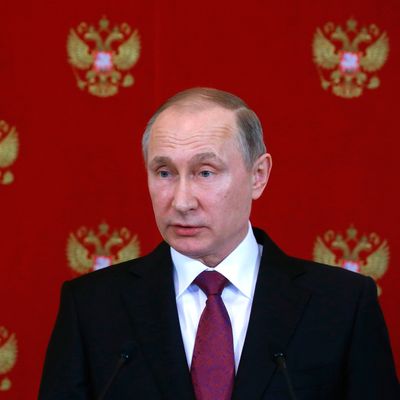
Vladimir Putin has had better weeks. Eight days ago, the American government made its weary acceptance of Bashar al-Assad’s staying power official. So, with his client in Damascus finally secure, Putin could turn his attention to Rex Tillerson’s upcoming visit — and how he might convince his old friend from Exxon to lift a sanction or two.
And then toxic gas rained down on Idlib province. And one of Russia’s greatest diplomatic achievements this decade — the 2013 agreement that led Assad to hand over his chemical weapons — was nullified. And the emotionally volatile cable-news addict in the Oval Office saw pictures of dead children and decided that Syrians were human enough to avenge with missiles (but not so human that the refugees among them should be allowed into the United States).
Now, instead of casually threatening to abandon America’s existing NATO allies, Trump is welcoming Montenegro into the alliance. And the UN ambassador who, just two weeks ago, said that ousting Assad wasn’t a “priority” is now making noises about regime change. And the secretary of State whose friendliness with Moscow threatened his appointment is saying that Russia was “complicit” in Assad’s attack, or has “been simply incompetent” at managing its client state.
At this point, it’s not clear whether Putin will even meet with Tillerson during the latter’s visit to Russia this week.
So, you can imagine how upset the Russian president must be with the man who decided to launch last week’s chemical-weapons attack — some random terrorist who wanted to make Assad look bad.
“We have reports from multiple sources that false flags like this one — and I cannot call it otherwise — are being prepared in other parts of Syria, including the southern suburbs of Damascus,” Putin said Tuesday of last week’s gas attack in Idlib, at a press conference with Italian president Sergio Mattarella. “They plan to plant some chemical there and accuse the Syrian government of an attack.
“President Mattarella and I discussed it, and I told him that this reminds me strongly of the events in 2003, when the U.S. representatives demonstrated at the UN Security Council session the presumed chemical weapons found in Iraq,” Putin continued. “The military campaign was subsequently launched in Iraq and it ended with the devastation of the country, the growth of the terrorist threat, and the appearance of the Islamic State on the world stage.”
Putin went on to call for the international community to pursue a thorough investigation of the attack and “take appropriate action based on the results of such a probe.”
On Tuesday afternoon, the White House decried Putin’s narratives as “disinformation,” and released a point-by-point rebuttal of Moscow’s claims, as part of a four-page report summarizing U.S. intelligence on the chemical attack.
“Moscow’s response to the April 4 attack follows a familiar pattern of its responses to other egregious actions,” the report argues. “It spins out multiple, conflicting accounts in order to create confusion and sow doubt within the international community.”
It is true that the Kremlin has variously suggested that last week’s attack was a “false-flag” effort meant to frame Assad and that it was the accidental result of the Syrian government bombing a terrorist ammunition depot that happened to contain chemical weapons. The report exhaustively rebuts the latter narrative, claiming that the U.S. has obtained video and satellite imagery that shows a chemical weapon was dropped into the middle of a road.
Meanwhile, in Lucca, Italy, Tillerson suggested that if Russia would break ties with its unreliable loser friends, it might regain a seat at the table with the popular Western countries:
I hope that what the Russian government concludes is that they have aligned themselves with an unreliable partner in Bashar al-Assad. They had signed the chemical weapons accord themselves — the Syrian Government; the Russian government had signed that accord; and now Assad has made the Russians look not so good under these circumstances.
I think it’s also worth thinking about Russia has really aligned itself with the Assad regime, the Iranians, and Hezbollah. Is that a — is that a long-term alliance that serves Russia’s interest, or would Russia prefer to realign with the United States, with other Western countries and Middle East countries who are seeking to resolve the Syrian crisis?
Tillerson’s statement suggests that, for Russia, the price of rapprochement with the United States may now be a break with Assad.
The secretary of State is set to meet with his Russian counterpart, Foreign Minister Sergey Lavrov, on Wednesday. According to Politico, that meeting is likely to yield “standard diplomatic statements in which they agree to disagree on any number of things,” but that “one measure of how well things go will be whether there’s a decision made on whether and when Trump should meet Putin face-to-face.”
Until then, Vladimir can only wait — and wonder about what might have been.






























